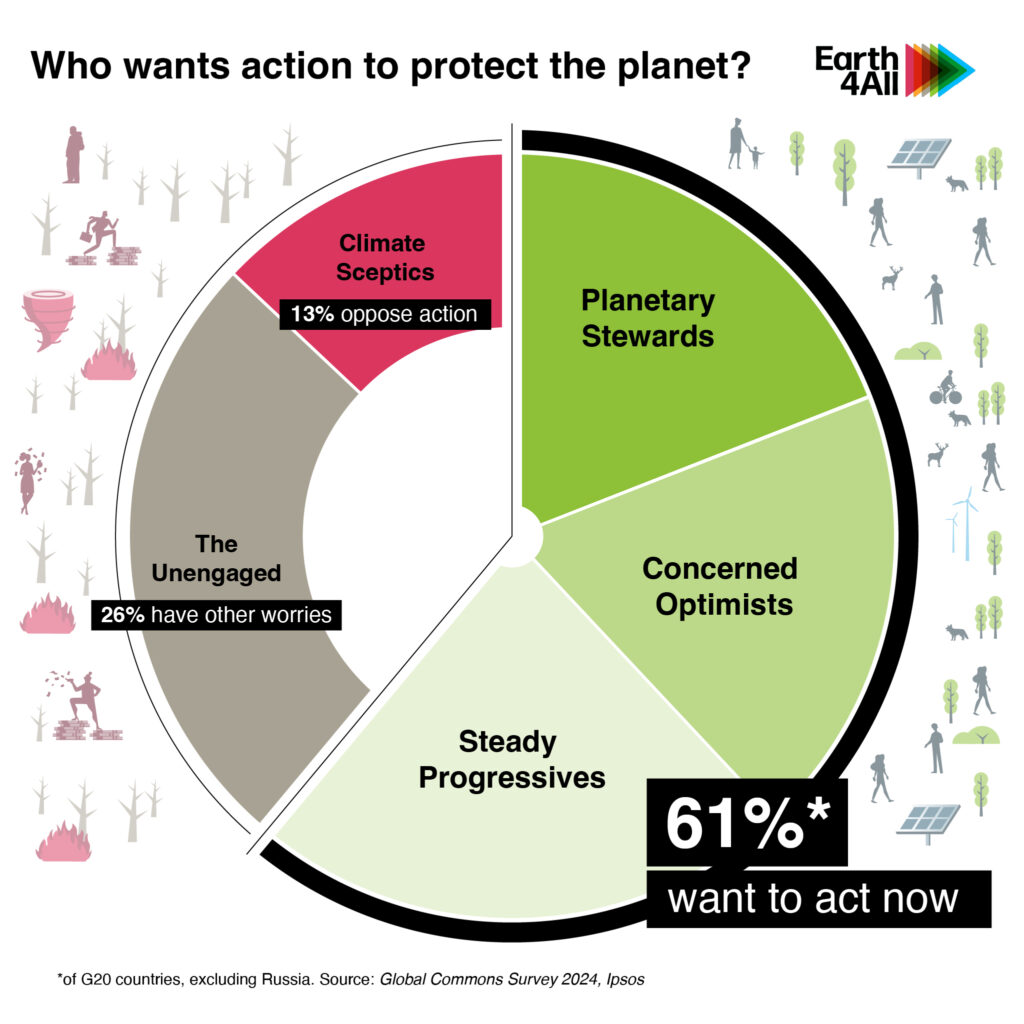Uncovering global attitudes to systems change
In 2024, Earth4All and the Global Commons Alliance commissioned Ipsos UK to survey global attitudes to some of the most pressing issues of our time, from the economy to the state of nature . The results are divided into two reports: the Global Commons Survey, addressing planetary stewardship, and the Earth for All Survey, focusing on economic systems change.
The findings reflect a worldwide call for bolder action to protect our planet and achieve wellbeing for all. Explore them on this page.

The Earth for All 2024 Survey
Exploring global attitudes to political and economic transformation
What do people around the world think about political and economic transformation?
We asked 22,000 people across the world’s largest economies their opinion on issues from tax reform to democracy.
The Earth for All 2024 Survey reveals overwhelming public support for progressive tax reforms and broader political and economic changes to reduce inequality and increase wellbeing.

Explore our key findings
The Global Commons Survey
New insights into global attitudes to climate, nature, and the future of our planet.
We asked thousands of people across the world's largest economies their views on the state of the planet.
The Global Commons Survey, covering 18 G20 countries and four further emerging economies, captures growing concern about the state of nature, awareness of planetary tipping points, and the demand for stronger environmental protections to safeguard our planet for future generations.

Explore our key findings
The Planetary Steward Segments
The Global Commons Survey introduces the Planetary Steward Segments: five distinct groups that reflect the global population and its attitudes towards environmental stewardship. The segmentation offers insights into each group’s views on climate, economy and society.
Across the G20, Planetary Stewards, Steady Progressives, and Concerned Optimists combined make up the majority of people. We have reached a social tipping point, where more people care for – and want action to protect – the planet than don’t.

Download the data
Global data
Global data: Global Commons Survey
Global data: Earth for All Survey
Data by country
Methodology
Ipsos surveyed 22,000 participants aged 18 to 55-75 in total across 22 countries. This included 18 G20 countries (Argentina (1,000), Australia (1,000), Brazil (1,000), Canada (1,000), China (1,000), France (1,000), Germany (1,000), India (1,000), Indonesia (1,000), Italy (1,000), Japan (1,000), Mexico (1,000), Saudi Arabia (1,000), South Africa (1,000), South Korea (1,000), Turkey (1,000), United Kingdom (1,000), United States (1,000)), plus four countries outside the G20: Austria (1,000), Denmark (1,000), Kenya (1,000) and Sweden (1,000). All interviews were conducted online and took place between 5th March and 8th April 2024.
Overall percentage results are an arithmetic average of national results across the 18 G20 countries surveyed.
Quota sampling was used, and in each country, data are weighted to be representative of the national population on age, gender, region and working status. Where results do not sum to 100, this may be due to rounding, multiple responses, or the exclusion of ‘don’t know’ categories.
For the segmentation analysis, ‘ensemble’ clustering techniques were used. Rather than running a cluster analysis once, ensemble techniques run many possible solutions that through an iterative process converge on a solution that is highly stable and reproducible. The base size for the segmentation is 16,841, based on all valid responses once those giving ‘don’t know’ or ‘prefer not to say’ responses to specific questions are removed.
The research was commissioned by Earth4All and the Global Commons Alliance. Supporting partners include the Policy Institute at King’s College London, ISWE and the Wellbeing Economy Alliance.
Stay up to date with new insights
To receive updates from Earth4All, including new data and insights from our global survey, sign up for our newsletter.
